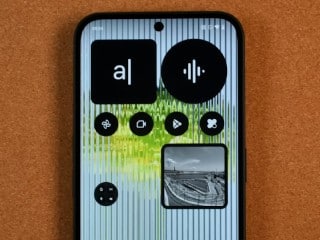- Home
- Mobiles
- Mobiles News
- Android Q Beta Debuts: How to Download, Compatible Devices, New Features, and More
Android Q Beta Debuts: How to Download, Compatible Devices, New Features, and More

Android Q Beta 1 is available for download on all Pixel phones
Android Q, which is the next iteration of Google's mobile operating system and comes as the successor to Android P released last year, has now been made official. Google has released the first beta build of Android Q specifically for Pixel users. While the list of all the changes coming to the new Android version is expected to be released at the time of its public debut -- sometime in the third quarter of this year, the Android Q Beta 1 brings some of the significant upgrades over Android Pie. One of the new offerings is the availability of the precise permissions for giving location access to apps. Google has also added improvements pertaining to foldable phones.
Android Q supported phones
Similar to how Google brought Android P initially, the first beta version of Android Q is available for Pixel, Pixel XL, Pixel 2, Pixel 2 XL, Pixel 3, and Pixel 3 XL. The search giant has notably retained the original Pixel models, though they already passed the general support window of receiving Android version updates for the first two years from their debut.
How to download Android Q
Users with Pixel, Pixel XL, Pixel 2, Pixel 2 XL, Pixel 3, and Pixel 3 XL can experience the initial features of Android Q by participating in the Android Beta Program. This will provide Android Q beta updates over-the-air (OTA) on the compatible Pixel models.
However, Google has also provided downloadable factory images for all the eligible Pixel phones. Enthusiasts can also opt for sideloadable OTA files.
If you don't own a Pixel device but are keen to experience what Google has brought through the first beta of Android Q, you can download the latest emulator system images via the SDK Manager in Android Studio and see all the changes through the Android Emulator.
It is worth mentioning here that similar to all the existing beta updates, the first beta build of Android Q is only meant for testing purposes. Therefore, it is recommended to download the build on a secondary device and be ready to face some issues during the course of your usage. You can, however, give your feedback and report bugs to the Android team.
Android Q rollout timeline
While Google has now released the first beta build of Android Q, the final public release of the new Android platform is planned for the third quarter of this year. Meanwhile, the next beta release is scheduled for early April that would be followed by the third beta build of Android Q. It should be announced at Google I/O 2019 that will begin on May 7.
Google is also set to bring the fourth beta build of Android Q along with final APIs and the official SDK in addition to Play publishing offering for supported apps in June. However, the fifth and the sixth beta builds of the new platform will come in the third quarter as release candidates for testing and final testing, respectively. After that, the Android maker is set to bring the final release to AOSP and the ecosystem.
What's new in Android Q
The first beta build of Android Q aka Android Q Beta 1 brings some of the major changes over what was available on Android Pie so far. The first change is the additional control for sending location details to apps. Similar to iOS, users on Android Q can select whether they give apps permission to see their location never, only when the app is in use or running, or all the time when it is in the background.
![]()
Android Q provides a new location permission screen
"For example, an app asking for a user's location for food delivery makes sense and the user may want to grant it the ability to do that," explains Dave Burke, VP of Engineering (Android), Google, in a blog post. "But since the app may not need location outside of when it's currently in use, the user may not want to grant that access. Android Q now offers this greater level of control."
Aside from precise permissions for apps accessing location data, Google has brought some privacy protections to Android Q. Burke claims that the new operating system gives users the ability to control apps' access to the Photos and Videos or the Audio collections via the new runtime permissions. Apps on Android Q also need to use the system file picker to reach the Downloads folder. This would help users decide which files from the Downloads folder the app can access.
Android Q is also designed to prevent apps from launching activity while in the background. "If your app is in the background and needs to get the user's attention quickly -- such as for incoming calls or alarms -- you can use a high-priority notification and provide a full-screen intent," writes Burke.
Google is also limiting access to non-resettable device identifiers such as device IMEI and serial number. Further, the device's MAC address when connected to different Wi-Fi networks by default will also be randomised.
Android Q is also aimed to improve the performance of Wi-Fi connectivity alongside maintaining user privacy through a refactored Wi-Fi stack. There is also new Wi-Fi standard support, WPA3, and Enhanced Open to improve security to some extent. Additionally, there are improvements towards use cases such as managing IoT devices and suggesting Internet connections without asking for location permission.
Alongside the major privacy- and security-focussed changes, Android Q has improvements for foldable devices. There will be the ability to support multi-resume and notify apps when they're in focus. Developers will also be able to manage how their apps will be featured on a foldable and large screen. Moreover, Google is updating the Android Emulator to support multiple-display type switching.
![]()
Android Q offers improvements for foldable phones
As sharing on Android isn't as smooth as on an iOS device, Google has developed Sharing Shortcuts that is a part of Android Q. This new feature will allow users to simply jump into another app to share content from one app.
To make things easier for developers using the Sharing Shortcuts mechanism, Google has expanded the existing ShortcutInfo API. "This new API is also supported in the new ShareTarget AndroidX library. This allows apps to use the new functionality while allowing pre-Q devices to work using Direct Share," highlights Burke.
Android Q also comes with a new Settings Panel API that allows developers to show key system settings directly in the context of their app. There is a settings panel in a floating UI that provides settings such as Internet connectivity, NFC, and audio volume to users -- all without leaving the app. There are also new connectivity APIs and extended ability to let developers use Android's connectivity stack.
Google has brought a new Dynamic Depth format that will give third-party apps access to add bokeh effects to images. "Starting in Android Q, apps can request a Dynamic Depth image which consists of a JPEG, XMP metadata related to depth related elements, and a depth and confidence map embedded in the same file on devices that advertise support," describes Burke in his blog post.
![]()
Dynamic Depth on Android Q gives specialised blurs and bokeh options
The addition of Dynamic Depth image functionality could be extended to create 3D images or enabling AR photography on devices in the future. Also, since Google is making Dynamic Depth an open format, device manufacturers are likely to integrate the new experience within their phones based on Android Q.
Android Q also comes with new audio and video codecs. The platform supports video codec AV1 to enable high-quality video streaming along with consuming less bandwidth. Similarly, Google has provided support for audio encoding using Opus that is optimised for speech and music streaming. The new Android version also has HDR10+ support to enable high dynamic range video playback on supported devices, including the Samsung Galaxy S10 family.
Google has also brought MediaCodecInfo API and Native MIDI API to enhance the multimedia experience on Android Q. Likewise, there is experimental support for graphics abstraction layer ANGLE on top of Vulkan to enhance the gaming performance and graphics rendering on devices running Android Q.
"Our goal is to make Vulkan on Android a broadly supported and consistent developer API for graphics," says Burke. "We're working together with our device manufacturer partners to make Vulkan 1.1 a requirement on all 64-bit devices running Android Q and higher, and a recommendation for all 32-bit devices. Going forward, this will help provide a uniform high-performance graphics API for apps and games to use."
Android Q also includes a list of improvements to the ART runtime to make app launches faster and let them consume less memory by default, without requiring any additional efforts from developers. There are also 60 new operations including ARGMAX, ARGMIN, quantised LSTM that are specific to the Neural Networks API (NNAPI).
To enhance security through biometric technologies, Android Q is extending support for authentication methods such as facial recognition, and providing implicit and explicit authentication flows. There is also support for TLS 1.3 to enhance security.
Google is moving towards newer API levels and set to warn users on Android Q with a dialogue box when they first run an app that targets a platform earlier than API level 23. Later this year, Google Play will also make it mandatory for apps to be based on 64-bit compliance.
As Android Police notes, the first beta build of Android Q brings alert options when a user long presses a notification. The Files app on the new Android platform has also reportedly been upgraded with filters and Material Theme tweaks.
![]()
Android Q provides alert options after long-pressing notifications
Photo Credit: Android Police
The lock screen of Android Q also blurs the background when a music file is playing in the background, as reported by Android Police. Moreover, an option is said to be in place to undo the removal of a homescreen icon.
![]()
Android Q lets you undo any icon removal from the homescreen
Photo Credit: Android Police
That being said, we are yet to see what will be the final name of Android Q. Some major interface-level changes are also likely to arrive sometime before its final public release that is expected to take place in early September.
Get your daily dose of tech news, reviews, and insights, in under 80 characters on Gadgets 360 Turbo. Connect with fellow tech lovers on our Forum. Follow us on X, Facebook, WhatsApp, Threads and Google News for instant updates. Catch all the action on our YouTube channel.
- Samsung Galaxy Unpacked 2026
- iPhone 17 Pro Max
- ChatGPT
- iOS 26
- Laptop Under 50000
- Smartwatch Under 10000
- Apple Vision Pro
- Oneplus 12
- OnePlus Nord CE 3 Lite 5G
- iPhone 13
- Xiaomi 14 Pro
- Oppo Find N3
- Tecno Spark Go (2023)
- Realme V30
- Best Phones Under 25000
- Samsung Galaxy S24 Series
- Cryptocurrency
- iQoo 12
- Samsung Galaxy S24 Ultra
- Giottus
- Samsung Galaxy Z Flip 5
- Apple 'Scary Fast'
- Housefull 5
- GoPro Hero 12 Black Review
- Invincible Season 2
- JioGlass
- HD Ready TV
- Latest Mobile Phones
- Compare Phones
- Tecno Pova Curve 2 5G
- Lava Yuva Star 3
- Honor X6d
- OPPO K14x 5G
- Samsung Galaxy F70e 5G
- iQOO 15 Ultra
- OPPO A6v 5G
- OPPO A6i+ 5G
- Asus Vivobook 16 (M1605NAQ)
- Asus Vivobook 15 (2026)
- Brave Ark 2-in-1
- Black Shark Gaming Tablet
- boAt Chrome Iris
- HMD Watch P1
- Haier H5E Series
- Acerpure Nitro Z Series 100-inch QLED TV
- Asus ROG Ally
- Nintendo Switch Lite
- Haier 1.6 Ton 5 Star Inverter Split AC (HSU19G-MZAID5BN-INV)
- Haier 1.6 Ton 5 Star Inverter Split AC (HSU19G-MZAIM5BN-INV)


![[Partner Content] OPPO Reno15 Series: AI Portrait Camera, Popout and First Compact Reno](https://www.gadgets360.com/static/mobile/images/spacer.png)









